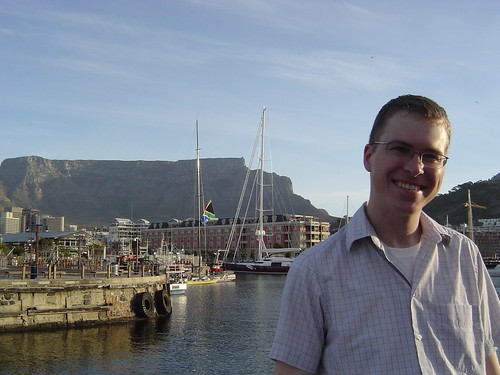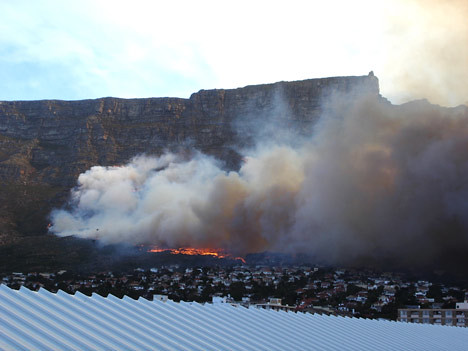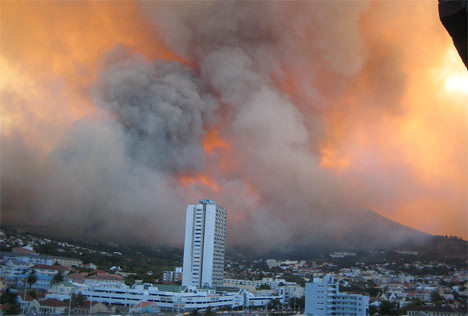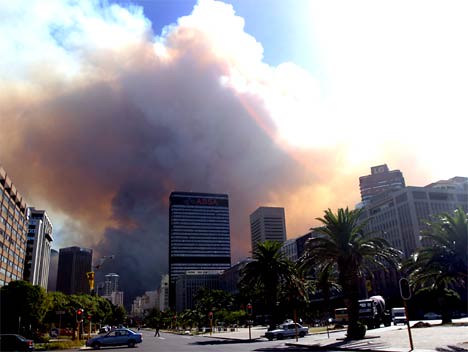We've got another offering today in the Is-It-Wrong-to-Laugh-at-Idiots-When-Their-Idiocy-Did-So-Much-Harm? category. And it's a doozy. It certainly tops
last week's media criticism from the apartheid government.
But first, to understand why what we're about to share is so cringe-worthy, we need to do a quick review of some South African history. A quick profile, if you will, of one of the good guys: a brilliant Anglican priest by the name of Father Trevor Huddleston.
Father Huddleston was born and raised in England, but sent to South Africa as a missionary, and ended up running a school in Sophiatown, the black community that was once located near downtown Johannesburg. In his 13 years in South Africa, he became more and more outspoken about the way the government treated black people, and he aligned himself with the African National Congress long before it was fashionable to do so.
His activism eventually attracted the attention of the National Party, the group that ushered in formal apartheid. And partly because of his protests over the forced removal of thousands of people from Sophiatown (which was eventually torn down by the less-than-brilliant urban planners of the National Party, who decreed that it was to become a "Europeans only" area) Father Huddleston was banned by the government and called back home by the spineless church leaders in England.
But when he got home, he wrote a book called "Naught for Your Comfort" that blew the whistle to the international community about what was really happening in South Africa and attacked apartheid as being a moral evil. It argued -- long before such sentiments were commonly held in South Africa, England, or, for that matter, the United States -- that any person with a conscience could not favor the policies being advanced by the government of South Africa.
"Any doctrine based on racial or colour prejudice and enforced by the State is therefore an affront to human dignity and ipso facto an insult to God himself," he wrote in his book. "There is no room for compromise or fence sitting over a question such as racial ideology when it so dominates the thought of a whole country."
And he attacked his own church, and its adherents: "It is not that white Christians are bad," he wrote, "It is simply that they fail to see the relevance of their faith to social problems."
When Huddleston died in 1998, two Nobel Peace Prize winners weighed in on his legacy. Archbishop Desmond Tutu said: "If I had to choose one person who got the anti-apartheid movement onto the world stage, that person would be Archbishop Huddleston without a doubt. The world was a better place for having had Trevor Huddleston." And Nelson Mandela said: "At a time when identifying with the cause of equality for all South Africans was seen as the height of betrayal by the privileged embraced the downtrodden. He forsook all that apartheid South Africa offered the privileged community. And he did so at great risk."
So it is in this context that I present to you the cover of a book that Katie found in our local used book store, which was written shortly after the publication of Huddleston's "Naught for Your Comfort."
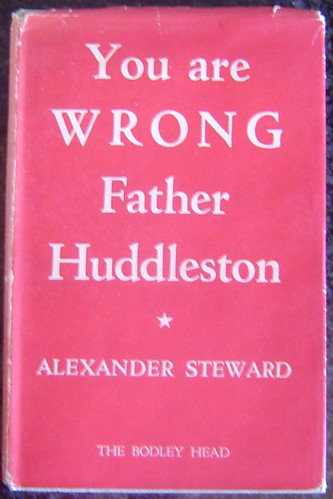
Wow. Talk about being on the wrong side of history.
And are you ready to cringe some more? (First, a reminder that the word "Bantu" was used to describe black people in South Africa back when the book was published in 1956, and is considered wildly insulting now.) This is from the inside jacket copy:
DESPITE the world-wide publicity given to Father Huddleston's campaign against the South African Government's native policy, the public in this country has had little opportunity so far of hearing the case of those who truly believe that in apartheid lies the most hopeful solution of South Africa's problems.
In a quiet, unemotional carefully reasoned book, Mr. Seward -- who from childhood has lived in close and (it is apparent from his writing) affectionate relation with native people -- makes clear the purpose of the present policy as a design for the long-term benefit of white and black alike.
He shows that direct competition with the more advanced European imposes severe limits on the self-realization of the Bantu...
Inside, in case you weren't sure what apartheid was about, Mr. Seward is kind enough to draw us a picture.
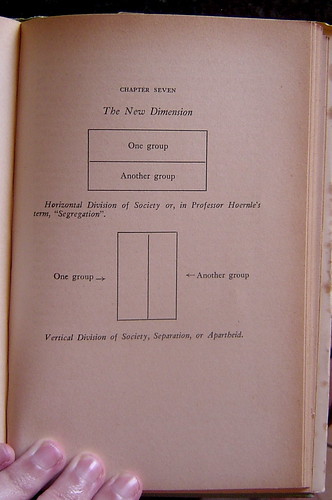
Viewing that picture, the incredulous chuckle sort of dies in your throat a little bit, along with any feelings of moral superiority. Of course when this book was published in 1956, segregation was alive and well in the United States.
A Wikipedia profile of Father Huddleston is
here, and an entry about him in a South African history website is
here. His obituary in the New York Times, from which some of this information is drawn, can be read on the ANC website
here.
